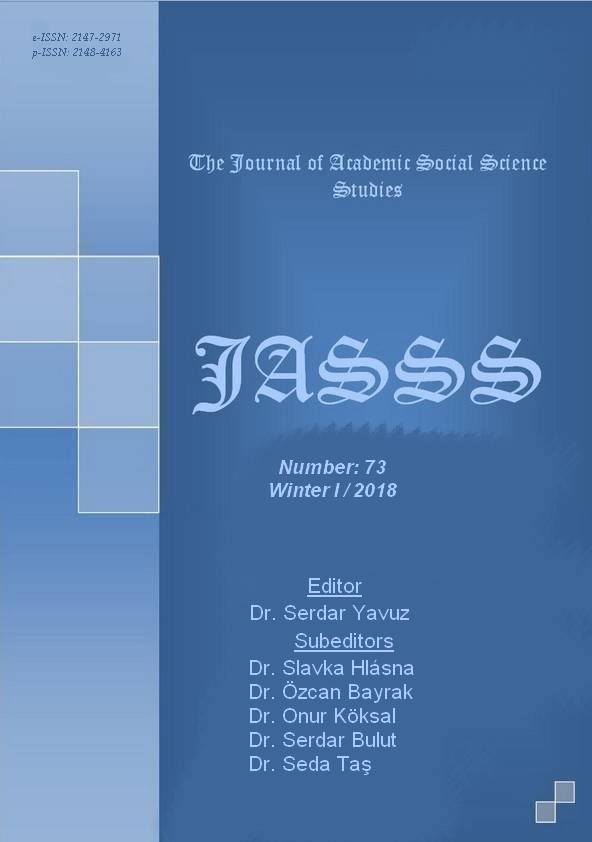ORTAOKUL ÖĞRENCİLERİNİN OKUMA BECERİLERİ İLE MATEMATİK PROBLEMİ ÇÖZME BAŞARILARI ARASINDAKİ İLİŞKİLER
Author :
Abstract
Problem çözme matematikte önemli bir yere sahiptir. Çünkü problem çözme için öncelikle matematiksel bilgi ve kavramlar arasında ilişki kurulmaktadır. Matematik problemi çözme becerisi ise, matematik alanında son yıllarda yapılan ders programı değişikliklerinin ardından günümüz matematik derslerinde ağırlıklı olarak yer verilen önemli becerilerden biridir. Bu becerinin geliştirilebilmesi için, üzerinde çalışılan problemlerin nitelikli olması gerekir ve problem çözüm sürecinde önbilgilerin ve becerilerin kullanımı önemlidir. Aynı probleme her öğrencinin bakış açısı ve yaklaşımı farklı olacağından, problemin çözümü de öğrenciden öğrenciye farklılaşabilir. Bu çözüm aşamasında, değişik yöntemler kullanılabilir ve verilen bir problemin çözümü sırasında kullanılan bu bilgi ve beceriler de matematiksel düşünme sistemini geliştirebilir. Bununla birlikte, sonuca ulaşabilmesi için öğrencinin benzer işlemleri bir araya getirmesi gereklidir. Bu aşamada, öğrencilerin büyük çoğunluğu bir problemle karşılaştıklarında doğrudan problemin çözümü için gerekli olan sayısal işlemleri gerçekleştirmeye yani problemi çözmeye odaklanır. Oysaki ilk olarak öğrencilerin problemi doğru bir biçimde anlamaları ve bunun için de öğrencilerin öncelikle problemi doğru bir biçimde okuyup anlamlandırmaları gereklidir. Başka bir ifadeyle, problemin iyi bir şekilde anlaşılması iyi bir okuma becerisine sahip olmakla gerçekleşir. Okuma becerisi ise, öğrenmenin temel araçlarından biridir ve öğrenciden öğrenciye değişkenlik gösterebilir. Öğrencinin okuduğunu anlaması için metnin yapısını çözümlemeli, metnin içeriğini anlamalı, yorum yapmalı ve metni analiz etmelidir. Bu nedenle, bu araştırmada ortaokul öğrencilerinin okuma becerilerinin, sıradan ve sıradışı problemleri çözme başarılarının incelenmesi, okuma becerileri ile problemi çözme başarıları arasındaki ilişkilerin araştırılması amaçlanmıştır. Bu amaçla, 2017-2018 eğitim-öğretim yılı ikinci döneminde Bursa ilinde bir ortaokulda öğrenim görmekte olan ortaokul öğrencilerine sıradan ve sıradışı matematik problemlerini içeren iki farklı test ile okuma becerileri ölçeği uygulanmıştır. Elde edilen veriler, nicel analizler aracılığı ile incelenmiştir. Yapılan incelemeler sonucunda, araştırmaya katılan ortaokul öğrencilerinin okuma becerileri ile problem çözme başarıları arasındaki ilişkiler rapor edilmiştir.
Keywords
Abstract
Problem solving has an important place in mathematics. For problem solving requires primarily establishing relationships between mathematical knowledge and concepts. The mathematical problem solving skill is one of the important skills which has been heavily emphasized in today's mathematics lessons following the course program changes in the field of mathematics in recent years. In order to develop this skill, problems under study need to be qualified and the use of previous knowledge and skills is important in the problem solving process. Since every student takes the same problem differently, the solution of the problem may differ from one student to another. In the solution stage, various methods can be used and the knowledge and skills used during the solution of a given problem may develop mathematical thinking system. However, a student needs to bring similar procedures together in order to reach a solution. At this stage, when they encounter a problem, a majority of students directly focus on carrying out numerical operations which are necessary for the solution of a problem, that is to say, solving the problem. Yet, firstly students need to understand the problem correctly and, in order to achieve this, they primarily need to read the problem and make sense of it correctly. In other words, understanding a problem well depends on having a good reading skill. And reading skill is one of the basic aims of a teacher and may differ from one student to another. In order to understand what is read, a student needs to analyze the structure of a text, understand the content of that text, make interpretations and analyze it. For this reason, in this study, it was aimed to examine the middle school students' reading skills and their levels of success at solving routine and non-routine problems, and investigate relationships between their reading skills and their problem solving success levels. With this aim, the middle school students studying at a the middle school students studying at a middle school in Bursa were administered two different tests including routine and non-routine mathematics problems and the reading skills scale in the spring semester of the 2017-2018 educational year. The obtained sets of data were analyzed by means of qualitative analyses. As a result of the analyses, the relationships between the problem solving skills and the problem solving success levels of the participant middle school students were reported.





